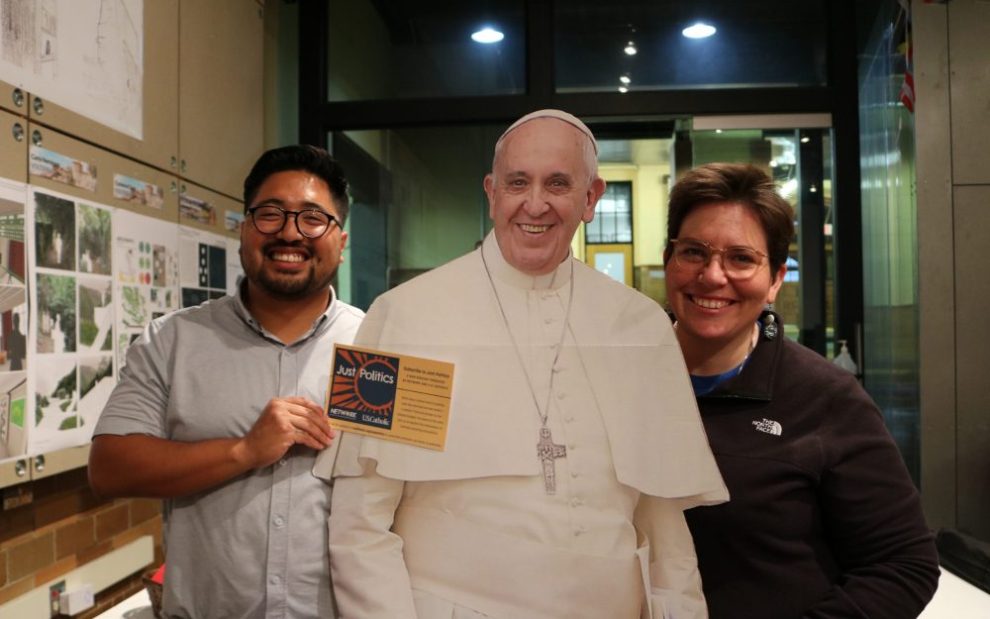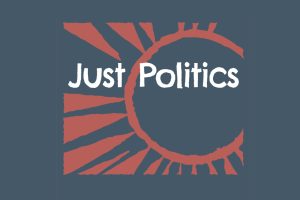In the work to promote an economically, socially, and racially just society, NETWORK, the Catholic social justice lobby founded in 1972 by women religious, has engaged all sorts of platforms, campaigns, and tactics—voter tours, legislative scorecards, virtual town halls, toolkits, workshops, and even some very successful road trips with nuns. Last year, NETWORK entered a new space: the world of podcasts, collaborating with U.S. Catholic magazine to launch a new podcast called Just Politics.
The podcast, hosted by NETWORK staff members Joan F. Neal, Colin Martinez Longmore, and Sister of the Humility of Mary Eilis McCulloh, covers current political issues and their intersections with Catholic social justice teaching. The first two seasons explored an array of topics, including reparatory justice, health care equity, the “pre-election scary season,” Pope Francis’ integral ecology, and how there are “no good billionaires.”
This month, Just Politics returns for a third season, this time with a focus on democracy: the urgent threats it faces, the promises it holds, and how we all—especially people of faith—can work to protect and strengthen it. This season will feature experts on democracy and Christian nationalism, including Amanda Tyler of the Baptist Joint Committee for Religious Liberty and Rachel Kleinfeld of the Carnegie Foundation. They will be joined by the usual lineup of guests, which has ranged from Catholic sisters, grassroots advocates, and theologians to members of Congress, faith leaders, and even a Vatican official.
“Democracy is one of the most important topics we can be talking about right now,” McCulloh says in the trailer for Season 3.McCulloh, the grassroots outreach and education specialist at NETWORK, is an organizer and law student who has worked with refugee and migrant communities. Martinez Longmore, the NETWORK communications and social media coordinator, previously worked on the Grassroots team with McCulloh and before that was a youth minister in Orange County, California. Neal, who has a master of arts in pastoral studies and currently serves as NETWORK’s deputy executive director and chief equity officer, is keenly attuned to both liberative spirituality and racial justice.
Together, the three co-hosts are a great snapshot of the spiritually centered, community-rooted political ministry that NETWORK lives out. Responding to the “signs of the times,” NETWORK is increasingly focused on democracy work, including mobilizing, lobbying, and advocacy action around voting rights, electoral participation, anti-gerrymandering, and holding elected officials accountable to the common good (rather than corporate interests).
As Neal warns in one of this season’s episodes, “This is not a hypothetical or theoretical conversation. The threat is real. Our democracy is at a crossroads. People have been and will be hurt because this is about power, who has it and who doesn’t, who wields it and who doesn’t, and whose will, rights, lives, and values rule the day and whose don’t.”
Specifically, Neal is referring to the anti-democratic force of Christian nationalism, which looms large in the trailer to Season 3. Christian nationalism will be a central part the season, especially as NETWORK looks ahead to the third installment of the White Supremacy and American Christianity series with Father Bryan Massingale and Robert P. Jones this October 21.
Neal reiterates in the trailer how it is impossible to talk about threats to democracy without also talking about Christian nationalism and racism. Anti-democratic policy always targets communities of color and anyone not part of the wealthy, white Christian ruling class minority.
This conversation about democracy implicates all of us, including Catholics. As Christians, Catholics have a particular responsibility to call out the dangerous lie of Christian nationalism. And working for liberation from every form of oppression—including theocracy—is the content of the Catholic faith. Even further, Catholics have been a crucial swing vote in the last few national elections, and many Catholics have readily supported candidates whose rhetoric and actions erode democracy. Catholics need to hold one another accountable and form one another in a holistic understanding of the common good. That’s one of the aims of this podcast.
In the Season 3 trailer, the hosts’ excitement for another season is evident, along with a sense of exhaustion. Martinez Longmore says, “I just saw my first political ad for the 2024 election . . . I’m tired.” The hosts share their fear of political violence much like the United States saw on January 6, 2021. They speak to the exasperation and dread that many across the country are feeling in the face of economic and political systems so destructive and broken that healing—much less functionality—seems far-off.
In response, much of this season of Just Politics focuses on how we can spiritually sustain the everyday work of democracy and justice-making. “We need an internal and external framework to hold onto in times like these,” says Neal. Guests this season will share how they draw on their faith and other sources of hope to keep going in the long, hard work of advocacy.
Democracy, ultimately, isn’t just a system in which everyone gets a vote, shows up to the polls, and goes home (and we’ve got a long way to go to even get there). A democratic ethic has to go beyond what happens on election day, or even what happens in electoral politics. It has to be about a culture of participation, in which we are able to encounter one another and collaborate in our mutual liberation. Relationships of solidarity that we live into each day are the fabric of true democratic life.
It’s these relationships of solidarity and encounter that Just Politics amplifies. As Martinez Longmore notes, “I often hear messages coming from parishes and certain church leaders about a society that I don’t see myself in, or that doesn’t take my family and community into account. I want to find a space and other people talking about how our faith can speak into a multicultural and inclusive society. . . . We have the opportunity to talk to people who see that vision and work for it, and to uplift that picture, so people know it does exist.” Indeed, this podcast is one such space.
Just Politics offers a glimpse of the liberative, participatory democracy that Catholic social teaching seeks to cultivate. The listening, solidarity, mutual care, and steadfast commitments to loving one’s neighbor that enliven this project comprise the only ethic that will ever bring about anything close to a just politics and a just world—the kingdom of God we are called to help make.
Neal says it well: “Work to safeguard our democracy is work on behalf of justice, transformation, protection of people, and liberation from the oppression of autocracy or theocracy. Popes including John Paul II, Benedict, and Francis have reiterated that call as a part of our mission in the world. We have to sound the alarm about our democracy because Catholics have a mission, an obligation, to help save it.”
Image: Courtesy of NETWORK













Add comment